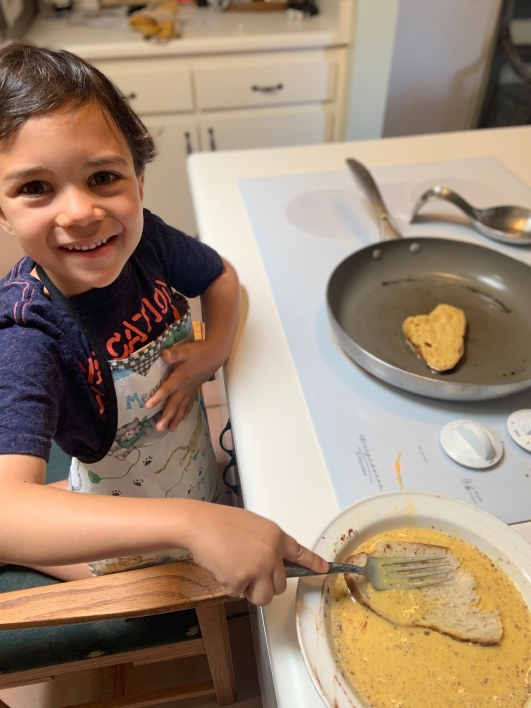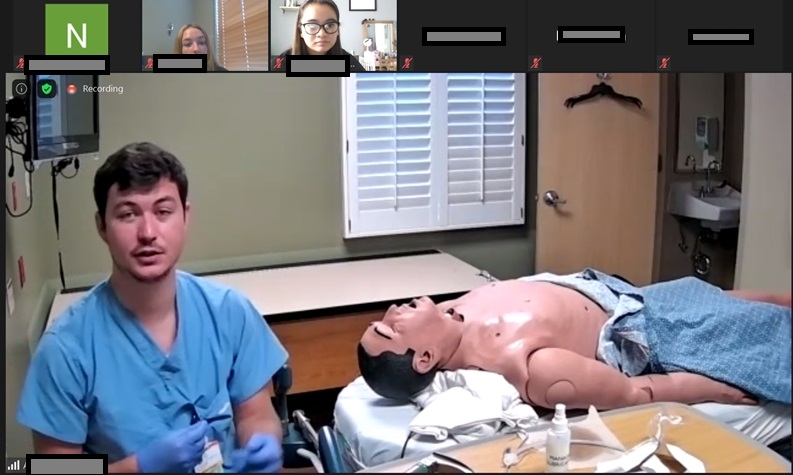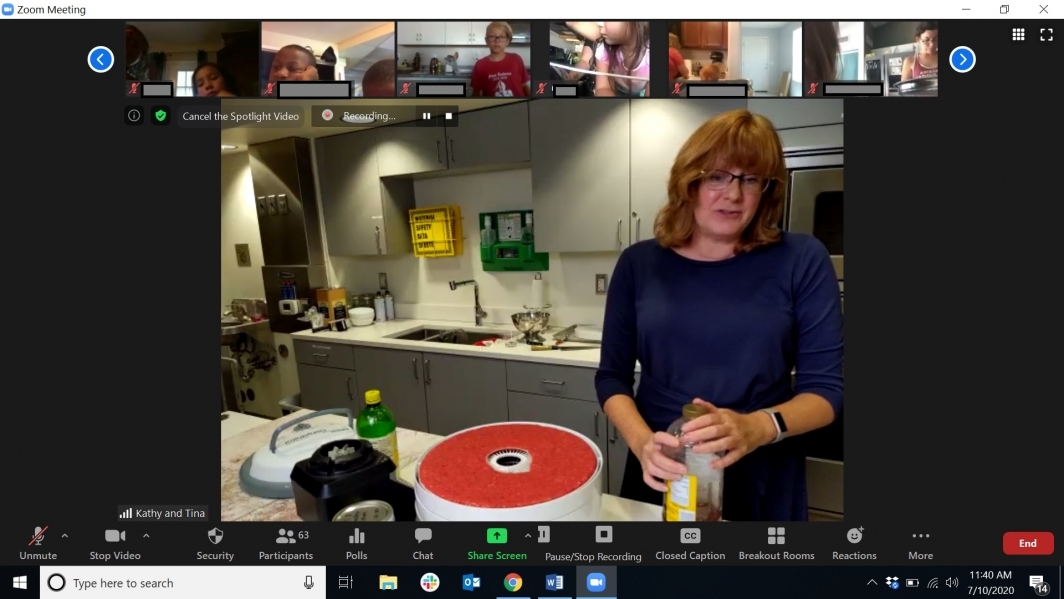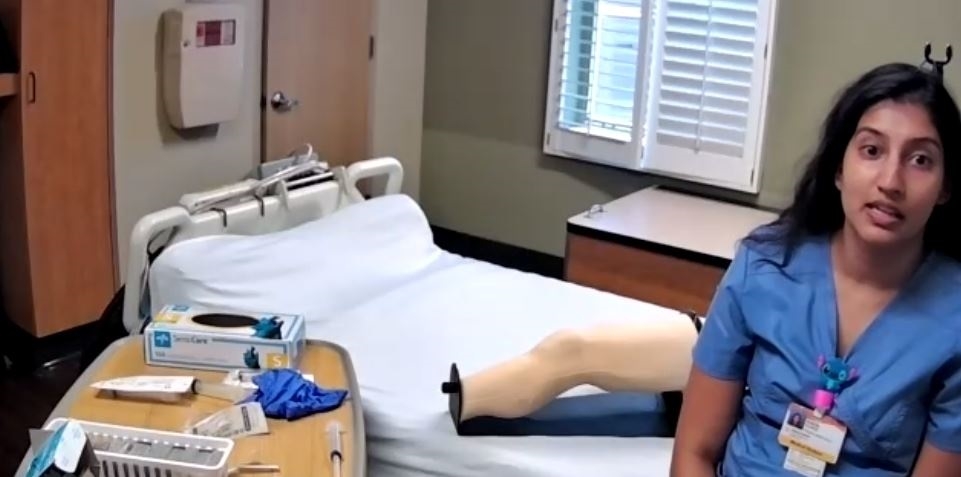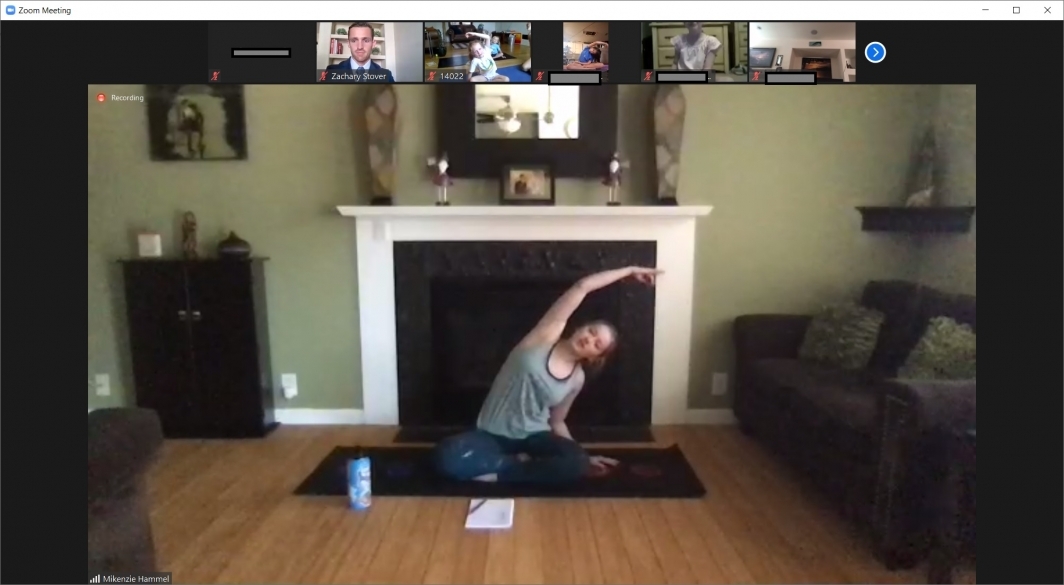Remote programming brings College of Health Solutions’ summer of health to more K–12 students, families
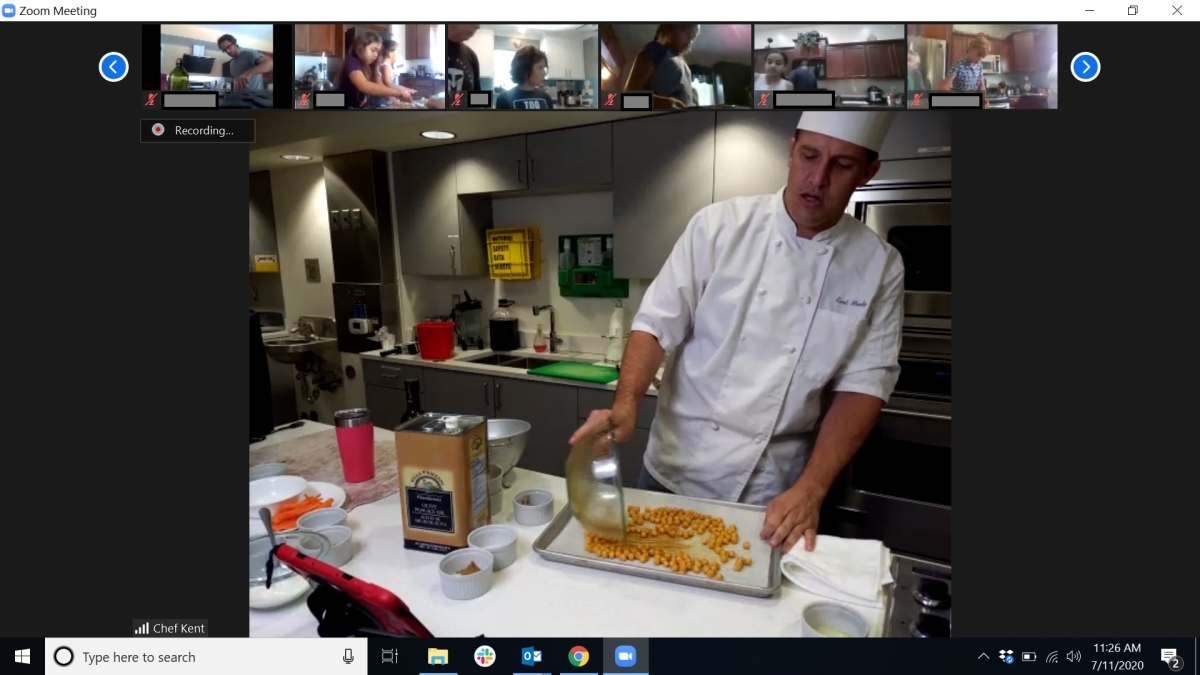
Chef Kent Moody demonstrates a healthy chickpea snack recipe during a Health Adventure Quest lesson.
What do yoga, grilled cheese, lumbar punctures, lettuce seeds and infectious diseases have in common? Nothing, unless you were one of the 450 K–12 students who participated in Arizona State University's College of Health Solutions’ first-ever virtual summer programs initiative.
Delivering fun and educational health content online proved to be a huge success this past summer, reaching more students from a wider variety of backgrounds and locations than ever before.
When the COVID-19 pandemic closed schools, canceled concerts and emptied public places, the College of Health Solutions moved two summer programs online to provide opportunities for students and families to continue learning during physical distancing: Health Adventure Quest, a two-week session for K–8 students to improve their health through cooking, gardening and exercising with Health Solutions chefs, dietitians, master gardeners and ASU students; and Summer Health Institute, offered for the past six years as an on-campus experience for high-achieving high school seniors interested in professional health careers.
‘Did you know honey never goes bad?’
Pulling off a monumental, logistical feat like Health Adventure Quest, or HAQ as participants called it, with its live, all-online format took a village of program experts, event planners, course designers and volunteers. HAQ adapted some of the activities from the college’s Camp CRAVE, its healthy lifestyles and cooking summer program, added exercise and gardening classes to the mix, made it all free of charge, and promoted it Arizonawide and beyond to K–8 students and their families. More than 400 students from 12 different states signed up, with daily attendance ranging from 60 to 164 for hourlong sessions held in July.
Participants were given a resource list in advance so they could gather supplies and ingredients for each activity before joining the day’s live Zoom session. One day they would be in their kitchens cooking grilled cheese sandwiches along with instructional retail kitchen coordinator and chef Kent Moody, another day in their living rooms practicing yoga and exercise with ASU students, and yet another day gardening with faculty members Kathy Dixon and Tina Shepard. Participants could join any activity at no cost, and the college provided a specially designed, printable HAQ map for students to track the sessions they attended to earn a certificate.
While the task of converting a hands-on, in-person camp to an all-virtual experience was a challenge, the resulting success made it well worth the effort.
“It was great to be able to reach hundreds of students rather than the few dozen who are normally able to come to in-person camps, and it was important to us to provide a free, educational and flexible health resource to parents and kids stuck at home during the COVID-19 pandemic,” said Zach Stover, College of Health Solutions’ coordinator of summer programs and K–12 outreach. “I have taught in the rural parts of Arizona where students do not have access to the resources and tools they need to address their own health and wellness, so to be able to share ASU’s wealth of educational resources, tools and knowledge was phenomenal.”
Almost all the participants were located in Arizona, and, while more than 400 kids were registered, Stover, who monitored each Zoom session, often counted many more than one student and adult gathered around each computer screen.
Both students and parents were enthusiastic about the program which came through in their comments submitted on a postprogram survey. “Did you know honey NEVER GOES BAD????” wrote a student, displaying some of the knowledge he picked up from one of the lessons.
“This was one thing my kiddos looked forward to this summer,” said Chasity Byrd, whose two children, ages 10 and 13, both participated. “They are still growing their gardens!”
After cooking along with Chef Kent for two weeks, this 5-year-old participant told his mom, “I want to cook forever!" Photo courtesy Nicole Houk
Cooking sessions were a favorite. “My kids loved Chef Kent. He got them interested in healthy cooking,” said one parent from New Mexico.
“I was very impressed with the level of recipes. It wasn’t just a simple snack — the kids made meals to share. I also loved that it included learning about keeping our bodies active,” said one Arizona mom.
Other parents appreciated some of the more practical aspects of the program. “It was great that we could use what we made for lunch or dinner that day. A win-win!” said a parent from Pennsylvania.
“It was such a blessing during this COVID time to have something we could do together, or even by my kids on their own if I had a work conflict,” wrote another parent. "My kids are already asking when we can do it again."
‘Encouraged and excited to reach my goal of becoming a physician’
While Health Adventure Quest was a new initiative, Summer Health Institute has been offered by the College of Health Solutions for the past six years as an in-person summer program for future health and medical professionals. High-achieving high school students entering their senior year apply for the opportunity to come to ASU for one week to live in residence halls and attend hands-on classes led by physicians, medical students and health professionals from the Phoenix metro area.
Providing an intense immersive program is expensive, but generous donor support through the years has allowed the college to offer it free for all students, which has attracted high-quality students from underserved backgrounds but has also limited the number of participants to 24 per camp. Being able to offer the Summer Health Institute in a remote format meant an opportunity to open it up to many more students, but planning an effective and engaging online program, hands-on by nature, was a big challenge.
“The camp was nearly canceled this summer because of the difficulty in pivoting to a 100% virtual format while retaining the high quality of this program,” said Nate Wade, senior director of strategic initiatives for the college.
However, a collaborative team of College of Health Solutions staff and community partners from Creighton University School of Medicine in Phoenix worked tirelessly to successfully redevelop all content as virtual interactive modules and simulations.
“As faculty and leaders in health care education, we felt that educating students and the community was a priority even during the COVID-19 pandemic,” said Dr. Randy Richardson, a physician and regional dean for Creighton’s School of Medicine at the Phoenix campus. “We used what we learned from educating our own students in an online environment during COVID-19 to be able to continue the Summer Health Institute, even during these unprecedented times, to give high school students in our community the opportunities that Creighton University provides in health care professions.”
Forty-two students from 12 U.S. states and four students from Egypt joined live Zoom sessions to see and ask questions of physicians and third-year medical students from Creighton and Dignity Health as they performed medical procedure simulations such as lumbar punctures and knee aspirations. In addition to the medical simulations, students learned from panel discussions with current medical students and virtual job shadowing along with online course content on infectious diseases and health technology, earning badges upon completion.
“Although we participated virtually, we all still got to learn so much in the brief time we had,” said Namita Shah, a high school senior from Arizona.
Several students said they felt more sure of their career decisions after participating in the institute. “I’m even more encouraged and excited to reach my goal of becoming a physician,” said Hannah Thomas, a student from Ohio.
“Being able to ask questions, gain new knowledge and participate in a variety of simulations over Zoom has made me excited for the future and more sure that I want to pursue a career in the medical field,” said Lexi Centeno, from Illinois.
Funding and the future
While Health Adventure Quest and Summer Health Institute were free to participants, the College of Health Solutions committed significant faculty and staff time as well as out-of-pocket funds to deliver these programs. A generous donation from the Central Arizona Area Health Education Center, one of the five regional programs under the Arizona Area Health Education Centers’ umbrella, covered other expenses and established a new relationship with the college for future K–12 collaboration.
In addition to new connections with regional health partners, the success of the virtual summer programs has organizers thinking of new ways to reach an even wider K–12 audience with quality health education year round. For example, the Summer Health Institute course modules will be made available to high school seniors this fall, and the Health Adventure Quest recorded sessions are being offered as free resources for K–8 students in partnership with the Boys and Girls Clubs of Metro Phoenix, Valley of the Sun YMCA and Mountain Park Health Center, who expressed interest in using the health content to expand their existing curricula.
More Health and medicine
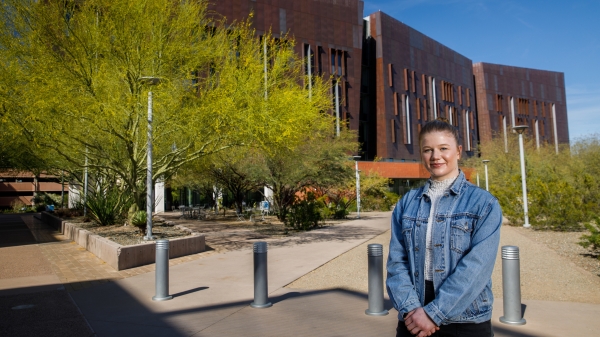
First exchange student for Biodesign Institute Europe bridges labs 5,000 miles apart
This spring semester, Grace Colley traveled to Arizona State University and became the first student to participate in the…
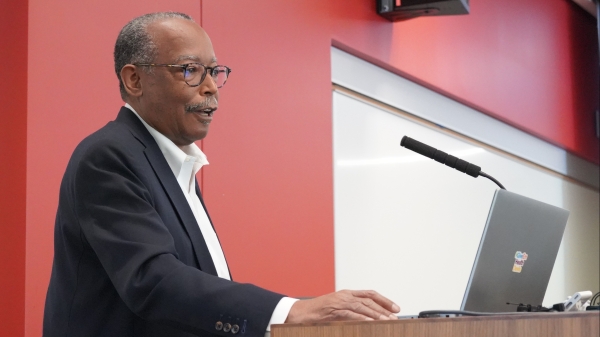
College of Health Solutions hosts visit from leading expert in genomic research
Some fortunate Arizona State University faculty, staff and students were able to gain valuable insights and perspective during a…
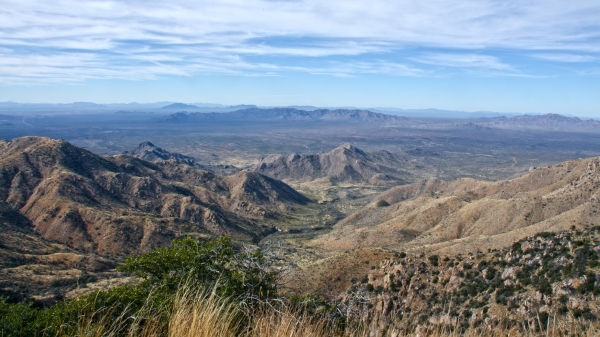
Indigenous ASU research team recommends assistance for tribal members still reeling from COVID-19’s effects
When Matt Ignacio’s tribe, the Tohono O’odham Nation, donated $1 million to Arizona State University to support COVID-19 research…
